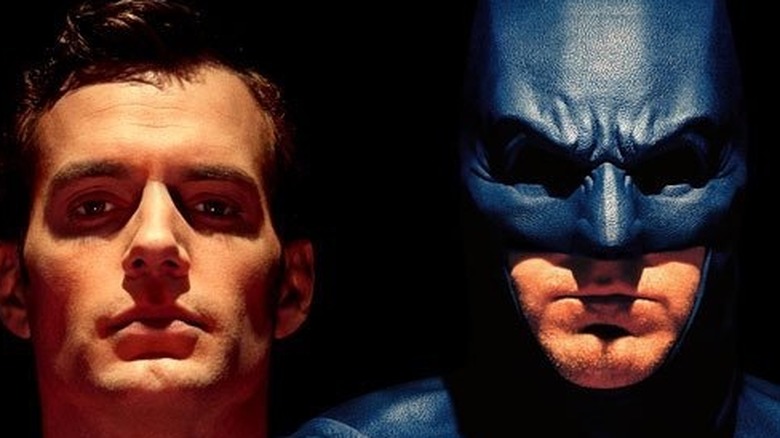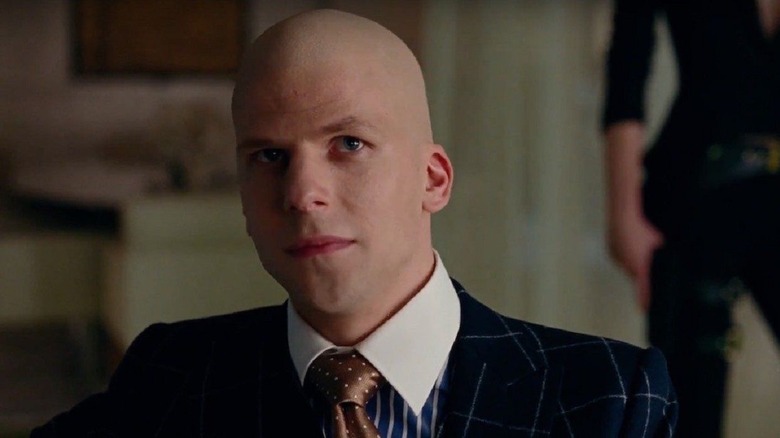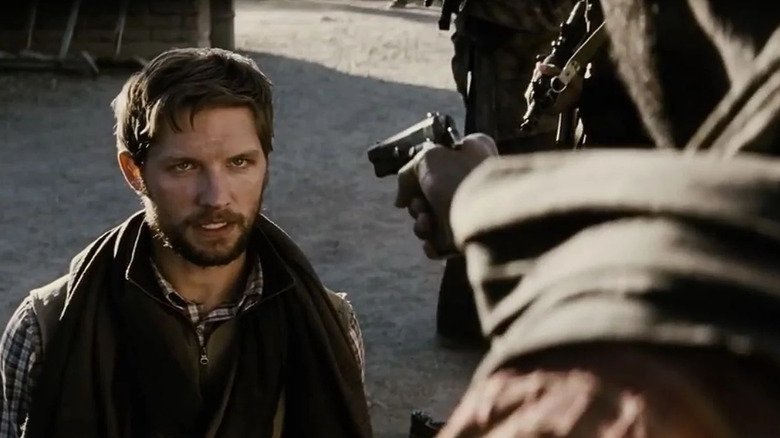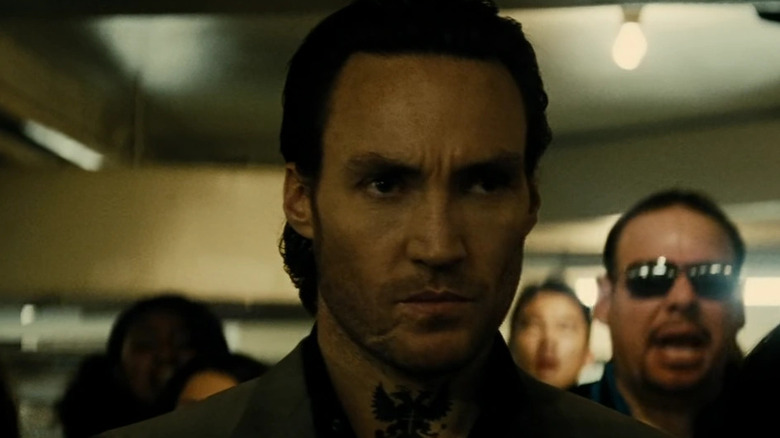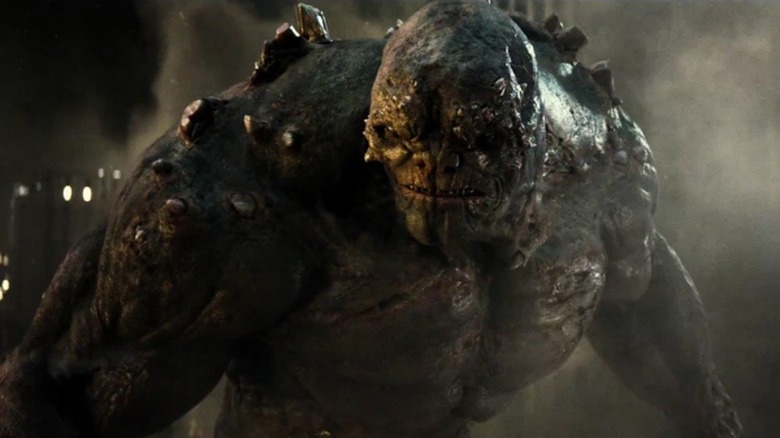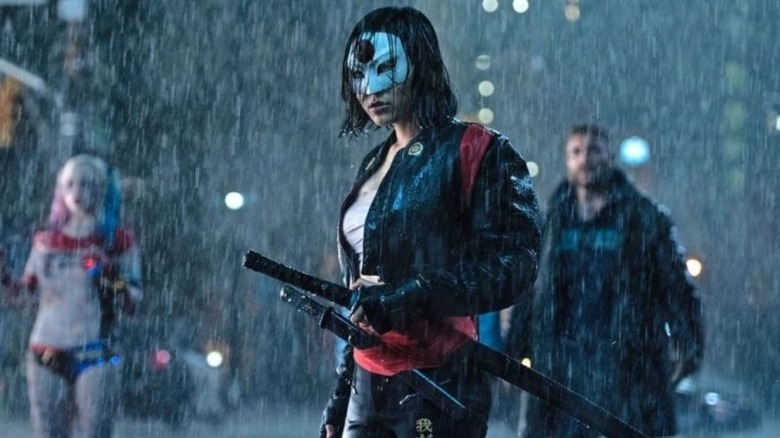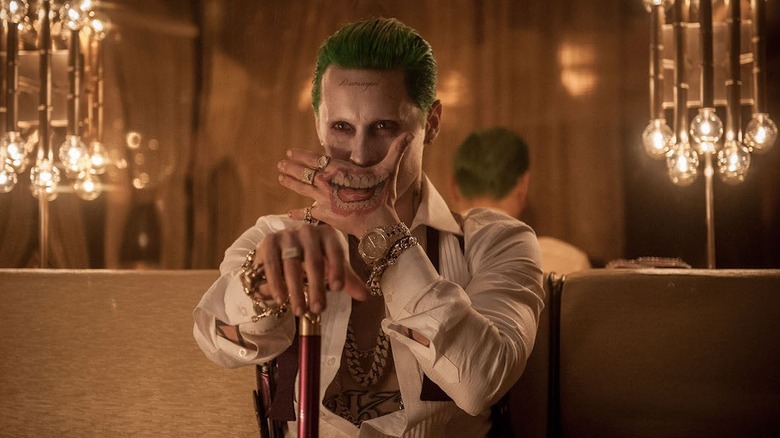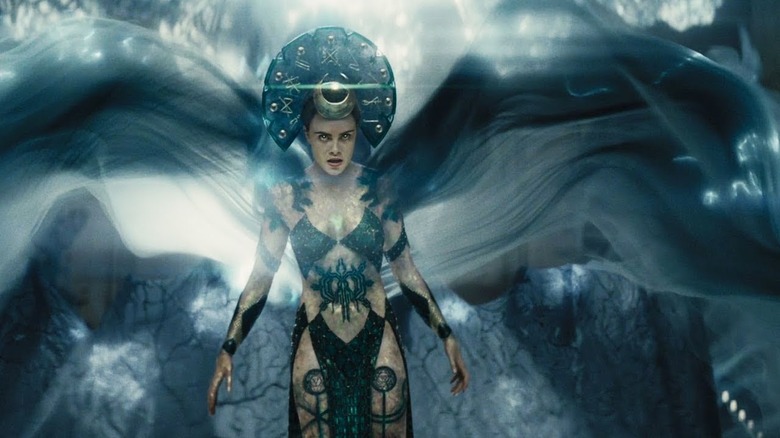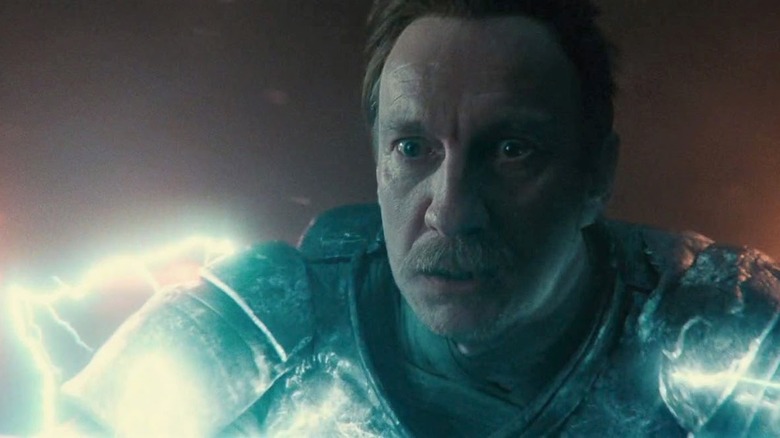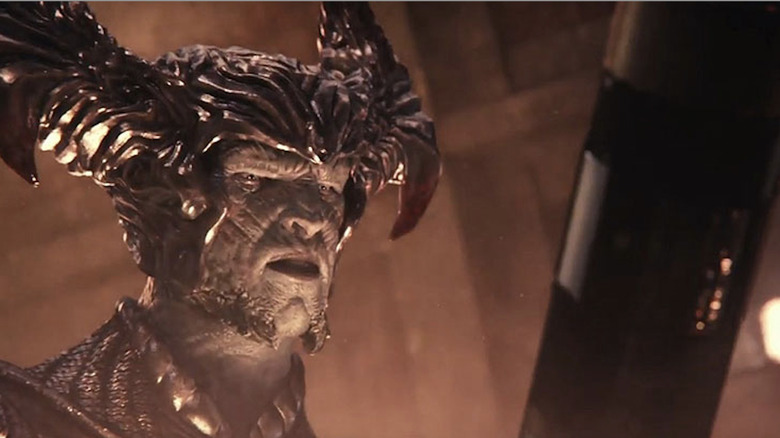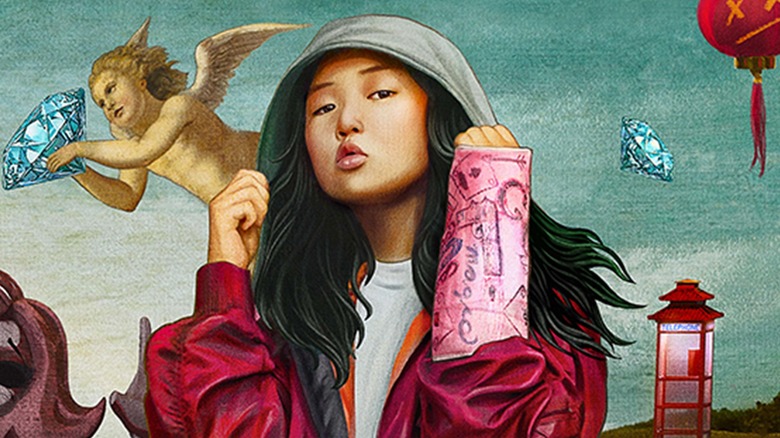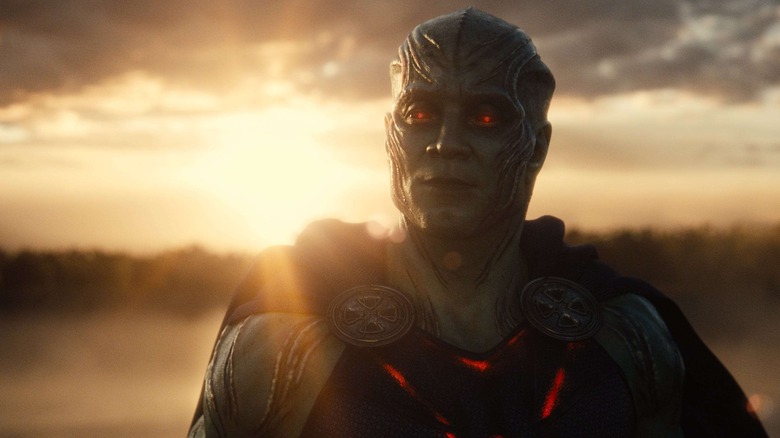DCEU Characters Fans Can't Stand
To say that the DC Extended Universe of films has been divisive would be an understatement. While it should be commended for taking some of its major characters in different directions in order to provide something new, change is often not well received, and sometimes, it's quite simply bad.
Though the DCEU has produced some well-regarded gems like "Wonder Woman," "Shazam!," and "Aquaman," there are still a number of characters that even the DCEU's most ardent fans simply cannot stand. Some of them were one-offs, others were brought back to plague audiences several times over. Whether the disdain stems from a failure to adequately adapt the source material, lousy casting or poor execution at a story or film level, these characters have not been well received, and only time will tell if they will ever get another opportunity to win over audiences on the big screen.
Jesse Eisenberg's Lex Luthor
A controversial casting decision from the get-go, Jesse Eisenberg's Lex Luthor was an attempt to adapt the classic Superman villain to fit the times. When Lex was first introduced in the 1940s, he was just a mad scientist named "Luthor," but when legendary comic book writer and artist John Byrne relaunched the Superman mythos in the 1980s, he made a very important addition to Lex that has stuck with him ever since: he's not just a mad scientist, but also a brilliant businessman.
What's more evil than a giant, faceless corporation? If Lex Luthor was in charge, it made perfect sense. But business trappings have changed dramatically since the 1980s, so when "Batman v Superman" adjustments tried to recognize that reality, it made sense to cast Jesse Eisenberg fresh off an Oscar nomination for playing the man some consider to be the most potentially dangerous CEO in the world, Mark Zuckerberg. Coming after the "Social Network," The idea seemed fine — but sometimes expectations don't line up with actualization.
Luthor had always been a character with gravitas and poise, but Eisenberg played the character as a quirky, talkative, socially awkward millennial who had launched a successful tech start up. He was Zuckerberg, with way less hair. From introducing him in a basketball court inside his "office" to hand-feeding a government official a Jolly Ranchers candy and having him wax religious about Superman's effect on the world, this Luthor was a departure from what many fans were accustomed to, and a long way from Gene Hackman's charismatically maniacal work in the Christopher Reeve "Superman" films. Fans did not appreciate the departure.
Michael Cassidy's "Jimmy Olsen"
Michael Cassidy's "Jimmy Olsen" only appeared in "Batman v Superman: Dawn of Justice" for about one scene, so it would be easy to miss why so many longtime DC fans hate his character so intensely and passionately. Many moviegoers probably had no idea who he was meant to be — he was barely introduced — but to Superman fans, this "portrayal" of one of the most classic members of Superman's supporting cast was nothing short of a slap to the face.
Introduced in the "Superman" radio serials of the 1940s, Jimmy Olsen is one of the most consistent pieces of Superman's life. Clark Kent always works at the Daily Planet, which almost always hosts the same cast of employees: Perry White is the editor-in-chief, Lois is the star reporter, and Jimmy Olsen is the main photographer and Superman's best friend.
Because of this, many longtime Superman fans were excited when Lois' photographer was name-dropped as Jimmy Olsen during the film. That excitement turned to disbelief when he "revealed" that he was actually a CIA agent, and that disbelief turned to disgust when he was immediately dispatched. It's one thing to just ignore Jimmy Olsen in a new Superman film franchise, but to immediately kill him off while simultaneously saying he doesn't exist? Not one of Zack Snyder's best decisions.
Callan Mulvey's KGBeast
In the comics, Anatoli Knyazev (aka KGBeast) is a former Russian super-soldier who worked for the Soviet Union. Think Marvel's Winter Soldier, but instead of being mind-controlled, he actually loves being a super assassin, and instead of having a metal arm, he has a metal energy cannon for a hand that can be interchanged with a variety of weapons to suit his needs, as he tried to murder the Batman once and for all.
During the course of "Batman v Superman," it wasn't surprising when "The Russian" was revealed to be Anatoli Knyazev, but many were surprised by the fact that he bore no resemblance to the comic book character whatsoever apart from his name and nationality. That surprise became dismay when the character didn't really do anything until the final act of the movie, in which he was unceremoniously killed by Batman while saving Martha Kent. This comic book Russian super-commando didn't even get to fight.
Batman v Superman's Doomsday
In hindsight, Doomsday's reveal at the end of the second major trailer for "Batman v Superman: Dawn of Justice" was probably one of the film's worst marketing decisions. Doomsday literally has one story. Apart from his general appearance as a sort of "spiky Hulk," he is known for one thing: killing Superman.
That's it, and showing Doomsday in that trailer told many fans that this film would end with Superman's death, and that was not an exciting prospect with this universe. "Batman v Superman" already had a lot to do for the DCEU. It was supposed to tell a compelling story while simultaneously introducing Batman, Lex Luthor, Doomsday, Wonder Woman, and every single member of the Justice League, and knowing that Superman would die meant the "Justice League" movie would have to introduce every member of the League again, while also finding time to resurrect the Man of Steel.
This didn't bode well for these films, and when Doomsday fell from the sky looking like a cave troll from Peter Jackson's "Lord of the Rings," their trepidations weren't alleviated. His fighting style wasn't especially impressive, his design only became decent in his last couple minutes of screen time, and his death at the hands of Superman seemed forced. Between his lackluster performance and what his inclusion meant for the franchise as a whole, it's not difficult to understand why so many fans would have preferred it if he had never appeared at all.
Karen Fukuhara's Katana
Katana boasts one of the best costumes in 2016's "Suicide Squad," and for as little screen time as she gets in the film, she's a remarkably well-realized adaptation of the comic book character. Despite this, however, she gets next-to-nothing to do in the film, and what little she does get is one of the most memed and mocked scenes in the movie.
The Suicide Squad is finally ready to board the helicopter and embark on their mission, but they have to meet one last person: the Japanese outsider named Katana, who fulfills the Squad's tradition of having a superhero on the team that acts as an enforcer for Rick Flag and helps keep the villains in line. Rick Flag introduces her and tells them all about Katana's magic sword and how being killed by it will literally steal your soul ... and the squad doesn't react, apart from Harley's standard quips.
It's an awkward scene at best. It seems like the filmmakers were trying to emphasize how tough the squad is by having them not care about Flag's threat, but the effect doesn't really come off in the execution. It's hard to tell if they are unimpressed, scared, or if they could even hear Flag at all. It's difficult to tell if the moment is meant to be serious or funny — and all of it comes at the expense of the Katana character, who is now almost exclusively known for a line she didn't even speak.
Jared Leto's Joker
Of all the characters on this list, Jared Leto's Joker is easily the most triggering of the bunch. From the very first photo that Warner Bros released of this Joker's new, gangster-focused look, DC fans have vocally shouted cries of "Not my Joker!" When 2016's "Suicide Squad" was released and those fans got to actually see this Joker in action, many of them did not change their tune.
It's difficult to summarize what it is about this Joker that bothers so many people. Though any actor would have struggled to follow Heath Ledger's beloved performance in Christopher Nolan's massively successful "The Dark Knight," that doesn't really seem to play all that large a role in the general disdain. From the start, many fans intensely disliked Joker's "generic gangster" look. From his many tattoos to his grilled teeth and excessive bling, this was not the traditional Joker, and many felt that the look entirely missed the point of the Joker's character.
Another large point of contention is that this version of Joker actually loves Harley Quinn. Typically, the Joker is a sociopath who only cares about Batman, so the fact that he actually loved Harley (who he typically just tolerated or used in the comics and cartoons) was a big departure that proved the final nail in the coffin for many. Leto's Joker was trying too hard to be "edgy," and his appearance in "Zack Snyder's Justice League" only added fuel to that fire.
Cara Delevingne's Enchantress
2016's "Suicide Squad" is the lowest ranked film in the DCEU on Rotten Tomatoes, and unfortunately, Cara Delevingne's Enchantress makes it easy to see why. Though there was nothing especially bad about the actress' performance, the character was essentially a walking trope. She had no depth or nuance, and performed most of her villainy through her brother and the strange creatures she turned some people into that were easily defeated by the squad.
Over the runtime of the film, Enchantress does little more than live out the trope of the "evil-is-sexy" villainous witch. Her poorly-named alter ego June Moone is basically forgotten, as is both her love story with Rick Flag and the fact that he is trapped in a Hulk/Bruce Banner sort of a situation. Despite ostensibly being the film's primary threat, she doesn't manage to kill a single member of the Suicide Squad, and never actually manages to be all that threatening.
Oh, and she also transforms people into monsters by making out with them. Was that really necessary?
David Thewlis's Ares
2017's "Wonder Woman" was a near-universally beloved film, but its third act ultimately falls short, and that was almost entirely because of David Thewlis' Ares. From the start of the film, Diana is obsessed with going to man's world and defeating Ares once and for all, believing that this is the key to ending war forever.
When she arrives in London, she is repulsed by its pollution but quickly finds people worth fighting for in Etta Candy (Lucy Davis) and the kind old Sir Patrick Morgan (David Thewlis). Eventually, Diana kills General Ludendorff, who she believes to be Ares, and the film unveils two twists that ultimately drag it down at the finish line.
Diana expects the fighting to stop after she kills the German general, but it doesn't. It's an excellent twist that directly challenges Wonder Woman's character and her belief in humanity. She thought that people were only fighting because of Ares, but they weren't. They were fighting because of themselves.
This powerful realization is immediately undercut, however, by the sudden appearance of Thewlis' Morgan, who has secretly been Ares all along. Devolving into the sort of bland CGI action the franchise is often criticized for, Diana kills this Ares too, and then the fighting actually does stop. She was right all along, as it turns out, and the aforementioned challenge to her character is completely ignored and undone. In retrospect, it would have been better if Ares wasn't in the movie at all.
Ciarán Hinds's Steppenwolf in 2017
Of all of the DCEU's many movies, Joss Whedon's "Justice League" is basically the one that broke the camel's back. Many fans expected this film to be the one that vindicated their belief and dedication to the franchise, but after Zach Snyder stepped down following a family tragedy, the studio ultimately rushed out an unfinished film that underwhelmed everybody, causing Warner Bros. to rethink their entire DC movie strategy.
The 2017 release's unfinished nature feels even more apparent in hindsight now that "Zack Snyder's Justice League" is streaming on HBO Max, and this disparity is perhaps most clearly felt with Ciarán Hinds' Steppenwolf. The visuals alone are night and day. After looking like an over-sized action figure in 2017, Steppenwolf leapt onto viewers' screens in 2021 looking like a different person. He no longer appeared human, and every individual piece of his entire armor shimmered and moved as he fought.
The upgrade only exacerbates what many were feeling about Steppenwolf in 2017. His visuals left much to be desired, and his character spent most of his dialogue time waxing poetic about "the Unity" while he appeared to caress and worship three boxes that he creepily referred to as "Mother." It wasn't a good look, and many fans are happy to see that old Steppenwolf gone for good.
Birds of Prey's Cassandra Cain
Ella Jay Basco did a fantastic job playing the character named "Cassandra Cain" in Cathy Yan's "Birds of Prey," but there was one hurdle that the film's script made sure that Basco could never overcome: Her character was absolutely nothing like her comic book namesake.
Basco's character was a sassy, street-smart pickpocket who just so happened to steal the wrong thing from the wrong person and get a $500,000 bounty placed on her head. Her character is smart and resourceful. She is funny and brings a lot to the film — but for many DC fans, that means literally nothing because her name is "Cassandra Cain."
In the comics, Cassandra Cain is the daughter of Lady Shiva, the deadliest, most skilled, and most dangerous fighter on planet earth. Shiva has beaten the usually-unbeatable Batman on several occasions, and she raised Cassandra to literally know nothing apart from fighting. Because of this, Cassandra is functionally mute, but she can perfectly analyze, predict, and (if she feels like it) copy the fighting style of anybody she faces.
Eventually, Cassandra abandons her parents and joins Batman as the third "Batgirl." The Bat-Family help her learn to speak and write, and Bruce Wayne even officially adopts her. Cain protects Gotham as Batgirl and eventually even defeats her mother in combat, becoming the best martial artist on earth.
The Cassandra Cain in "Birds of Prey" is an entirely separate character — sharing little more than, inexplicably, the name.
Harry Lennix's Martian Manhunter
"Zack Snyder's Justice League" changed many things about the film, but the change that did the most damage to the previous DCEU movies may have been Harry Lennix's Martian Manhunter. Lennix had previously been in both "Man of Steel" and "Batman v Superman: Dawn of Justice" as an Army General and then Secretary of Defense named "Calvin Swanwick," and he was great. He was stoic, level-headed, and though he was justifiably wary of Superman's power, he was pragmatic enough to accept his help. Then, Snyder revealed that he had been the Martian Manhunter all along.
Martian Manhunter is one of the most powerful superheroes in the DC Universe. Not only does he have all the powers of Superman, but he is also one of the most powerful telepaths in the universe, and can shape-shift and turn invisible too. He is an absolute power house — and watched all the events of those other movies while apparently offering no assistance, for no apparent reason.
He did nothing when Kryptonians invaded in "Man of Steel," and two of his top men died because of it. He could have saved Superman's life in "Batman v Superman," but instead sat back and watched as Superman was nuked by his own government and then murdered by a monster. Even in "Zack Snyder's Justice League," he completely ignores Darkseid and only appears to make sure Lois is alright. Though that is a very Martian Manhunter thing to do, repeatedly ignoring the world's destruction while others die in his place is most certainly not, and this incarnation only serves to remind the viewer of the haphazard, often seemingly last-minute decisions made concerning such DCEU characters.
